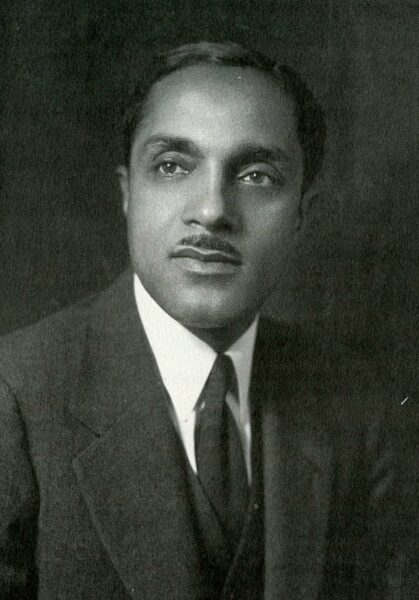
Charles H. Wesley
The contribution of landmark volumes to a range of fields in American and African American history is an enviable achievement for any historian. Charles H. Wesley, who published in labor, religion, the American South, and women, and in studies of Black fraternities, both Greek letter and mass based, showed breadth and mastery of the African American experience. Moreover, in numerous essays, Wesley explored the transatlantic impact of British abolitionism, with research support in Great Britain from the Guggenheim Foundation, and other transnational issues in the 19th and 20th centuries pertaining to African Americans. Wesley’s popular books included addenda to Carter G. Woodson’s Black history textbooks, editing and contributing to the 10-volume International Library of Negro Life and History (1967), and special studies that traced a succession of constitutional and civil rights initiatives to attain and safeguard Black civic equality.
Historian Michael R. Winston noted that Wesley “recognized the need to study the history of the black people of the world from the ‘inside out’ rather than the customary reverse. Thus, you will observe that most of his work was on the history of black institutions, organizations, and movements placed at the center of the historical canvas rather than the margins.” Hence, Wesley’s signature studies both disrupted the broader sphere of American history and chronicled the multifaceted infrastructure that remarkably sustained African Americans in subverting their subaltern status in American society.
Wesley, while earning his BA from Fisk University (1911), MA from Yale University (1913), and PhD in history from Harvard University (1925), nurtured an independent intellect. Though Albert Bushnell Hart, one of his Harvard professors, viewed the defeat of the Confederacy as owing to superior US force and resources, Wesley countered that it was Confederate demoralization that undermined the South’s willingness to fight. To sidestep Hart’s likely opposition, Wesley switched his dissertation topic to an examination of African American labor. The book that emerged, Negro Labor in the United States, 1850–1925 (1927), tracked the emergence of Black workers as crucial contributors to the nation’s industrial development. Nonetheless, Wesley returned to his original topic and published The Collapse of the Confederacy in 1937, in which he identified an extraordinary proposal to recruit Black soldiers to the Confederate army as one factor that showed the South’s general collapse of morale.
Wesley’s other major works related to his Black organizational affiliations and revealed his obsessive objectivity. Attending to a fraternity he served as national president, he wrote The History of Alpha Phi Alpha: A Development in Negro College Life (1929), as well as a biography of APA co-founder Henry Arthur Callis. From the 1950s through the 1980s, he also wrote histories of Sigma Pi Phi, the Improved Benevolent and Protective Order of Elks of the World, the Prince Hall Masons in Ohio, and the National Association of Colored Women’s Clubs, and a biography of Black freemasonry founder Prince Hall.
Wesley had a deep connection to the African Methodist Episcopal Church, for which he was a pastor and then a presiding elder, a role in which he oversaw several congregations. Prior to publishing Richard Allen: Apostle of Freedom (1935), the first scholarly biography of the AME founder, Wesley directed a three-year national survey of the “Negro Church” focused on Baltimore, an urban setting, and Suffolk, Virginia, a rural community. This collaborative sponsorship between the Institute for Social and Religious Research of New York City and the Association for the Study of Negro Life and History spoke to the wide recognition of Wesley’s scholarly expertise in African American religious history.
Wesley’s scholarly productivity and vocational versatility defined his lifetime from his birth in Louisville, Kentucky, on December 2, 1891, to his death in Washington, DC, on August 16, 1987. Despite the ongoing deployment of his busy pen to historical writing, Wesley was history department chair and dean of the graduate school at Howard University, president of the AME-affiliated Wilberforce University, and founder and president of Central State College. His administrative proficiency extended to his role as executive director of the renamed Association for the Study of African American Life and History (ASAALH) and as the founding executive director of the African American Museum in Philadelphia, built for the city’s 1976 bicentennial commemoration. Since 1994, the AHA and ASAALH have jointly sponsored the Wesley-Logan Prize, named in his honor and awarded annually to an outstanding book in African diaspora history.
Dennis C. Dickerson
Vanderbilt University
This work is licensed under a Creative Commons Attribution-NonCommercial-NoDerivatives 4.0 International License. Attribution must provide author name, article title, Perspectives on History, date of publication, and a link to this page. This license applies only to the article, not to text or images used here by permission.